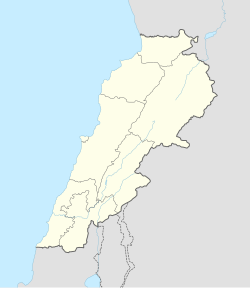Ghosta, Lebanon
Ghosta
غوسطا | |
|---|---|
Municipality | |
 Ghosta Monastery and Church, Lebanon | |
| Coordinates: 33°59′28″N 35°40′25″E / 33.99111°N 35.67361°E | |
| Country | |
| Governorate | Keserwan-Jbeil |
| District | Keserwan |
| Area | |
| • Total | 4.61 km2 (1.78 sq mi) |
| Elevation | 950 m (3,120 ft) |
| Time zone | UTC+2 (EET) |
| • Summer (DST) | UTC+3 (EEST) |
| Area code | 09 |
Ghosta (Arabic: غوسطا) is a municipality in the Keserwan District of the Keserwan-Jbeil Governorate of Lebanon. It is located 36 kilometers north of Beirut. Ghosta's average elevation is 950 meters above sea level and its total land area is 461 hectares.[1] Its inhabitants are predominantly Maronite Catholics.[2]
History
[edit]Ottoman tax records indicate Ghosta had 11 Christian households in 1523, 12 Christian households and one bachelor in 1530, and 15 Christian households and one bachelor in 1543.[3]
In 1838, Eli Smith noted Ghusta as a village located in Aklim el-Kesrawan, Northeast of Beirut; the chief seat of the Maronites.[4]
Ghosta has three schools, two private and one public, with a total of 772 students as of 2008. As of 2008, there were eleven companies with at least five employees operating in the village.[1] It is home to the Congregation of Maronite Lebanese Missionaries and its main monastery, and the birthplace of Lebanese pioneer painter, Daoud Corm (1852 – 1930) and of pioneer Lebanese journalist, Philippe Ziade (1909–2005).[5]
See also
[edit]References
[edit]- ^ a b "Ghosta". Localiban. Localiban. 2008-01-19. Retrieved 2016-02-12.
- ^ "Elections municipales et ikhtiariah au Mont-Liban" (PDF). Localiban. Localiban. 2010. p. 19. Archived from the original (pdf) on 2015-07-24. Retrieved 2016-02-12.
- ^ Bakhit 1972, p. 275.
- ^ Robinson and Smith, 1841, vol 3, 2nd appendix, p. 194
- ^ Khoury, Fayek. (1980). Fifty Years of Journalistic Memories (in Arabic).
Bibliography
[edit]- Bakhit, Muhammad Adnan Salamah (February 1972). The Ottoman Province of Damascus in the Sixteenth Century (PhD). School of Oriental and African Studies, University of London.
- Robinson, E.; Smith, E. (1841). Biblical Researches in Palestine, Mount Sinai and Arabia Petraea: A Journal of Travels in the year 1838. Vol. 3. Boston: Crocker & Brewster.

